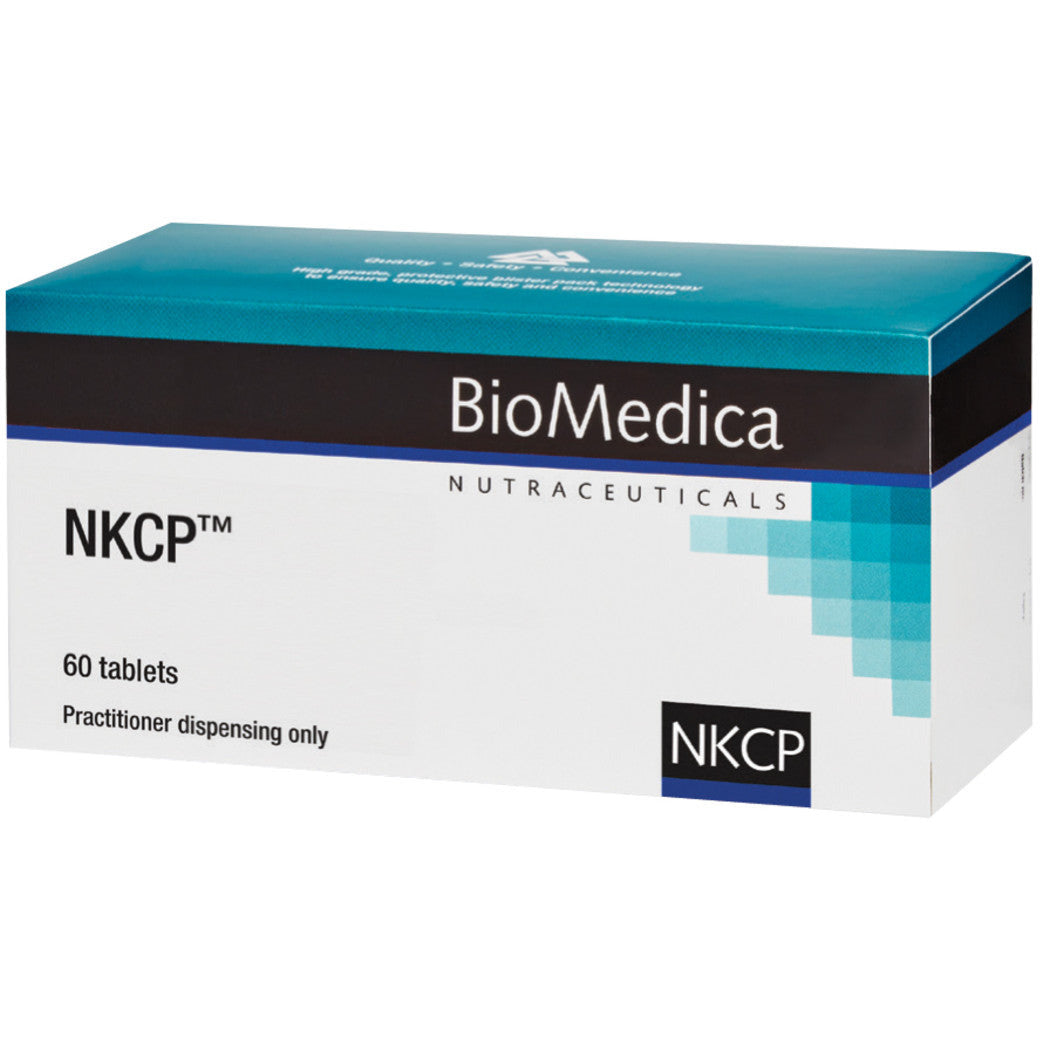Biomedica
BioMedica NKCP 60 tabs
BioMedica NKCP 60 tabs
Couldn't load pickup availability
PLEASE NOTE: THIS IS A PRACTITIONER ONLY SUPPLEMENT. IF YOU ARE PURCHASING THIS FOR THE FIRST TIME AND HAVE NOT BEEN ADVISED BY A HEALTH PRACTITIONER TO USE THIS PRODUCT, WE WILL NEED TO CONTACT YOU TO DISCUSS APPROPRIATE & SAFE USE BEFORE DISPATCH. PLEASE SUPPLY YOUR CONTACT DETAILS.
BioMedica NKCP is a natural source of Bacillopeptidase F.
The production of BioMedica NKCP is based on a unique and patented adaption of the traditional Japanese fermentation method that produces natto from soybeans. The major difference is in the capture and isolation of a unique proteolytic enzyme known as Bacillopeptidase F.
Bacillopeptidase F works by increasing the efficiency of the body's own haemostatic control mechanisms, and because of this unique mechanism of action, it regulates blood coagulation without the haemorrhagic risk associated with conventional blood thinners.
Bacillopeptidase F has the ability to balance clotting mechanisms and maintain blood viscosity has generated much attention for its potential therapeutic benefits in hypertension and lifestyle diseases.
Product Benefits
- Bacillopeptidase F a unique hypotensive and fibrinolytic enzyme.
- Bacillopeptidase F is an isolated protease secreted from Bacillus subtilis var. natto, a bacteria used to ferment soybeans to produce the traditional Japanese food, natto.
- Clinically, Bacillopeptidase F is of interest due to its ability to improve blood flow and regulate blood clotting mechanisms.
- Bacillopeptidase F works by increasing the efficiency of the body€™s own haemostatic control mechanisms, and because of this unique mechanism of action, it regulates blood coagulation without the haemorrhagic risk associated with conventional blood thinners.
- Bacillopeptidase F's ability to balance clotting mechanisms and maintain blood viscosity has generated much attention for its potential therapeutic benefits in hypertension and lifestyle diseases.
- Natto is fermented with a probiotic bacterial species (Bacillus subtilis) which promotes gastrointestinal health and is also rich in compounds shown to support cardiovascular (nattokinase) and bone (vitamin K2) health.
- Further, the manufacturing process completely removes the odour, bacterial components, other peptides and vitamin K usually associated with natto.
- As well as cardiovascular benefits, natto is a rich source of vitamin K2, which is important for bone health. In a 2012 Japanese study, scientists found that regular intake of natto was related to a significantly higher bone mineral density, which was largely due to the vitamin K content of natto. Other research tracking the bone mineral density of postmenopausal Japanese women over time discovered that those who consumed natto regularly were less likely to experience bone loss and were better protected against osteoporosis.
- Natto has been a traditional food in Japan for thousands of years, natto is made by cooking fermented soybeans. It has a flavour similar to fermented cheese. It has a sticky-stringy texture and is often served with condiments such as sliced green onions, wasabi or pickled ginger. Natto can also be used in stir-fries or curries, or in pan-fried natto and potato cakes.
- There is a growing body of research supporting the health benefits of natto. Nattokinase is an enzyme extracted from natto. Nattokinase can destroy blood clots, thin the blood and improve blood flow. It reduces the risk of hypertension, stroke and can also reduce the risk of a heart attack.
- Natto may be a natural, side-effect free alternative to pharmaceutical anticoagulants such as warfarin.
- As well as cardiovascular benefits, natto is a rich source of vitamin K2, which is important for bone health. In a 2012 Japanese study, scientists found that regular intake of natto was related to a significantly higher bone mineral density, which was largely due to the vitamin K content of natto. Other research tracking the bone mineral density of postmenopausal Japanese women over time discovered that those who consumed natto regularly were less likely to experience bone loss and were better protected against osteoporosis.
Fermented foods in the Japanese diet
- The fermented foods the Japanese enjoy include pickled vegetables (tsukemono) as a side dish or seasoning, pickled ginger on top of sushi, umeboshi plums, miso soup, and soy sauce, which is made from fermented soybeans. A traditional Japanese meal includes little bowls of food and fermented food included.
- Fermented foods are well worth incorporating into the diet. They are classed as probiotics because they contain live bacteria, and there is evidence that they are beneficial in the treatment of diarrhoea, IBS, inflammatory bowel disease and for protection against infection generally. Fermentation can also increase some of the micronutrients in food, B vitamins particularly, and for some people, it can make food more digestible.
Ingredients:
| Ingredients per BioMedica NKCP tablet | |
| Natto bacilli culture (NKCP) [soy-derived] | 125mg |
Directions
Take 1 tablet twice daily.
Allergen Information
BioMedica NKCP is free from wheat, egg, lactose, crustaceans, nuts, sesame, lupin
This product contains no ingredients derived from gluten-containing grains. The finished product has not been tested for the presence of gluten.
If a known allergen is not included on the free-from list above, please contact BioMedica for verification before prescribing this product.
Excipients
When using excipients BioMedica tightly controls the input quantity which results in the absolute minimum requirement. Some of the excipients below are attached to the raw material. We include these for full transparency.
- Microcrystalline cellulose
- Maltodextrin
- Sucrose esters of fatty acids
- Silicon dioxide
- Shellac
Warnings
Store in a cool, dry place below 25°C.
Share






